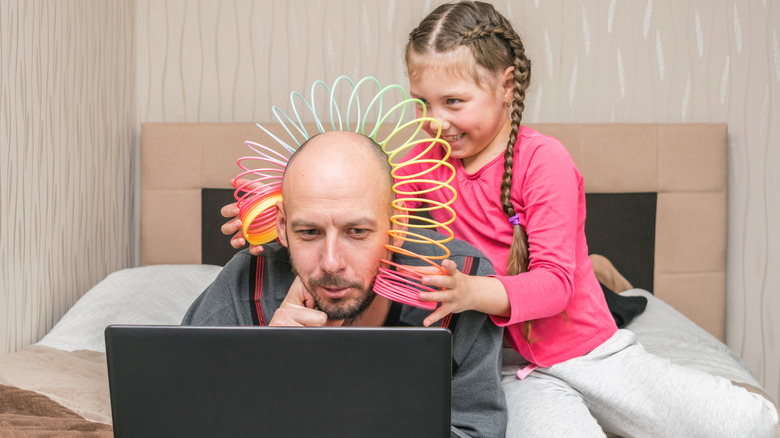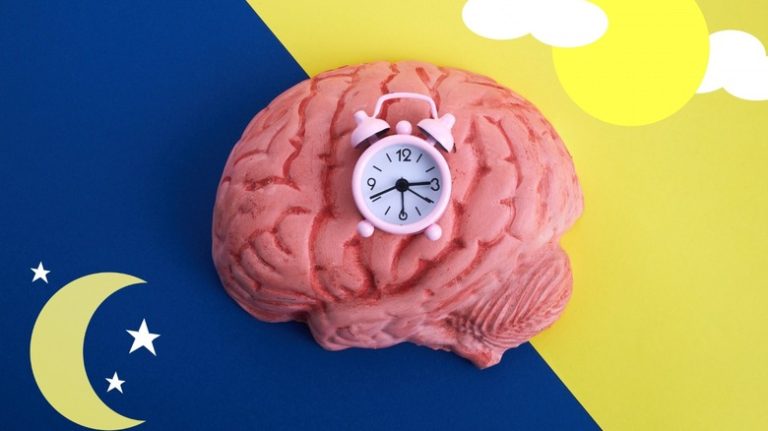If you have trouble falling asleep at night, you’re not alone. Believe it or not, sleep disorders are actually quite common, affecting around 70 million Americans every year (via Cleveland Clinic). In fact, 33% to 55% of the adult population experiences symptoms of insomnia in the U.S. But what exactly causes insomnia and how can you treat it or prevent it from happening in the first place?
“One of the top reasons I see for insomnia is due to conditioned insomnia. This is when the brain starts to associate the bed with a place of activity rather than sleep,” Dr. Julia Kogan, PsyD, a health psychologist and sleep, stress, and anxiety specialist, says in an exclusive interview with Health Digest. “Anything that we are doing in bed that is not sleeping will cause the brain to associate the bed with a place of wakefulness, which can make it hard to fall and stay asleep.”
Stop doing non-sleep activities in bed

Doing any non-sleep activities in bed, like using your phone or watching TV, can make it difficult for you to fall asleep at night, according to Kogan. As it turns out, these types of activities can cause you to toss and turn or even lay awake in bed all night. “So, if people want to improve their sleep, it’s very important to start to break this association and only get into bed when actually sleepy and to avoid all non-sleep activity in the bed (other than sexual activity),” Kogan explains.
“We cannot force sleep as most people have experienced, so if someone is not sleepy, it’s important that they stay out of bed until they are sleepy.” If you’re not sure if you’re tired or not, it can be helpful to look out for common signs of sleepiness, like heavy eyelids or a heavy-feeling body. It is only when you start exhibiting these signs that you should get into bed. It’s not to say this change has to be done overnight, however, the more consistent you are with it, the more it’ll help, adds Kogan.
How doing non-sleep activities in bed can impact your sleep and health
Failing to do this can impact your quality of sleep and overall health. That’s because doing non-sleep activities in bed can disrupt your sleep-wake cycle. “Once the brain starts to associate the bed with a place of activity, stress, tossing and turning, or anything that is not sleeping, it associates the bed less with a place of sleep and rest,” Kogan shares. “The more we do in bed that is not sleeping and the more time we spend in bed awake, the stronger this association becomes over time.” Keep in mind, this also applies when it’s time to get up in the morning, adds Kogan.
As a result, this association can make it increasingly difficult for you to fall and stay asleep at night and prevent you from getting the quality sleep your body needs to function properly and feel sufficiently rested the following day. And in turn, a lack of sleep or quality sleep can negatively affect your mood, appetite, physical health, and ability to focus and pay attention.
Changing your behaviors can improve sleep quality
fizkes/Shutterstock
Fortunately, there are a few steps you can take to help improve your overall quantity and quality of sleep. “First, it’s recommended that all activity occurring in the bedroom (other than sexual activity) is taken out of the bedroom to the extent possible,” Kogan says. “If they are unable to take certain things out of the bedroom for space reasons, such as a workstation or TV, it is recommended that they at least utilize a separate part of the bedroom for this that is separate from the bed.”
In addition, Kogan also recommends preparing the mind and body for sleep by engaging in relaxing activities and deep relaxation for around 30 to 60 minutes before heading to bed. Some of these activities can include deep breathing and progressive muscle relaxation. This can help both your mind and body relax and wind down before bed, which can make it easier for you to fall and stay asleep.
What to avoid doing before bed
DimaBerlin/Shutterstock
According to Kogan, you should also avoid using any electronic devices in bed before going to sleep. This includes watching TV, using your computer, or scrolling on your phone. Kogan says that it can be helpful to store these devices outside of your bedroom at night. “If someone lives in a studio or is unable to take certain activities out of the bedroom, then using these things out of the bed, such as sitting on the floor or sitting in a chair can be helpful,” Kogan shares.
That’s because electronic devices emit blue light, which can suppress your body’s release of melatonin and interfere with the sleep signals your brain sends to your body as bedtime approaches. “Limiting blue light specifically is important before bed so it does not send conflicting messages to the brain that it is time to be awake when it is actually time to prepare for sleep,” she says.
To learn more about Dr. Julia Kogan, visit drjuliakogan.com or find her on Instagram and LinkedIn.
